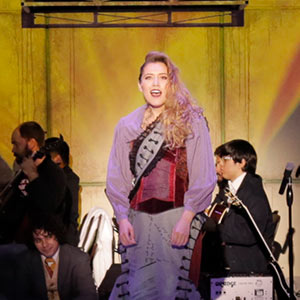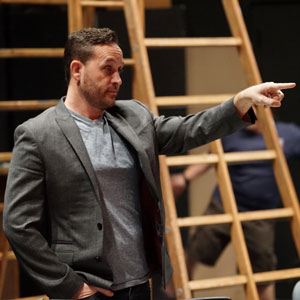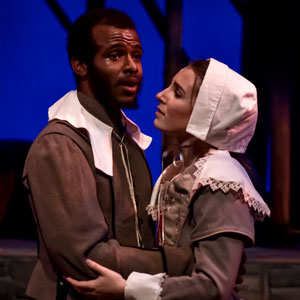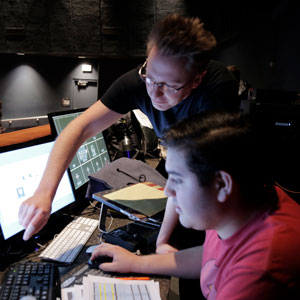Review: Look Forward to the production “Look Homeward, Angel”
— Fullerton College Hornet - JP Dabu - Thursday, October 6th, 2016
“Look Homeward, Angel” chronicles the life of 17-year-old Eugene Gant, portrayed by FC theater student Brandon Burns, and the struggles presented to him and his family as he seeks a life of independence and responsibility.
The setting is rural Altamont, North Carolina in the year 1916 with “Dixieland,” a boarding house overseen by Eliza Gant (Gabby Gutierrez), Eugene’s mother, at the forefront.
The audience is greeted by Jake Clatt’s (Matt Mullin) subtle guitar and harmonica introducing the residents of Dixieland, with each character entering stage one by one and engaging in casual conversation.
Laura James (Jessie Wise), a young attractive woman from Virginia, arrives at the house and decides to book a stay. The other men in the boarding house take full notice of the new customer, as does Eugene.
Suddenly, the Gant patriarch, W.O. Gant (Coleman Summers), storms the stage in a drunken fit of rage. He is soon settled down by his daughter Helen Barton (Lauren Sanders) and is led back into the house to rest.
After witnessing the chaos that ensued, Ben Gant (Jared Piper), Gene’s older brother, adamantly expresses his want to escape this familiar place. If he can’t do that, then he puts his full faith in his younger brother to do the task.
As the older brother, Ben stands for his younger brother to do what he cannot – live a life independently from his family.
As the play progresses, the characters of Gene and Laura grow to like each other after exchanging glances and a couple of laughable encounters, which soon forms into a romantic relationship.
It’s through their casual conversations that Gene reveals optimism in his aspirations with his love of words; vividly describing a train as it rides through a town.
As Laura’s story unfolds, Gene must face the consequences of a lost love. Professing love impulsively and sharing kisses is only a temporary love, one that can be easily broken.
Eliza Gant struggles to keep her family and the Dixieland together. No one is appreciative for all her hard work and she misses the innocence of her young boys. To her, the Dixieland is the only thing she has a firm gasp, in which she devotes her full attention and expenses towards it, besides her family.
W.O. Gant also struggles with his family but writhes in the pain of his old age, with his life experiences of loss and mental turmoil. But he also wants his youngest son to become something greater and attend college. His support for Gene is his natural action as a father figure.
As Gene takes a harder look at what has happened through the past years, it becomes obvious to Gene that his mother’s intentions are only for personal gain and not in her family’s interests. Gene sees his mother’s materialism revealed in her priorities to put her property before her own family.
Gene finally realizes his freedom from his family, while his mother soon acknowledges her son’s adulthood and independence.
Although she perceives things as if the world has been taken them away from her, Gene is off to find himself by leaving his past behind him and chasing his aspirations of college.
Burns captures the Gene’s dynamic of innocence and frustration, the key aspects of adolescent transition to adulthood. The actor’s sheer emotion resonates through his performance.
Wise as Laura James adds a captivating and charming quality to Dixieland that compliments the character of Gene, but enters with an unknown story that isn’t revealed until later on in the show.
But it is Summers that steals the show the moment he stumbled onto the stage as the drunkard father, W.O. Gant,
Summers reveals his wide range of emotion capabilities through his character, who’s crippled and burdened by the weight of family pressures.
Though, his female counterpoint, Eliza Gant, does the same. Gutierrez portrays a mother too reliant on her sons, but still perceives them as mere boys.
The actress perfectly displays both the caring compassionate mother figure as well as the hardworking, but corrupted soul of a materialistic tenant.
The wooden set of the Dixieland fully captures the time period of early 1900s southern America with its complex pattern of wooden boards that form windows and doors, coupled with rural sounds and the ambience-filling Tin Pan Alley records.
The rooms are completely open for the audience to observe every movement of the characters’ daily lives whether they are sleeping, conversing, reading or changing.
Burns explained that the production emphasizes “finding the hope and the ability to move forward in the most dire situations.”
“The show speaks to so many people’s lives and no matter where you come from I think you can find a little bit of yourself in each of the characters,” Burns continued.
The Fullerton College production of “Look Homeward, Angel” runs Oct. 7, 8, 14 and 15 at 7p.m. You can purchase tickets online for $12.50 or at the box office window for $15 an hour before the show.








